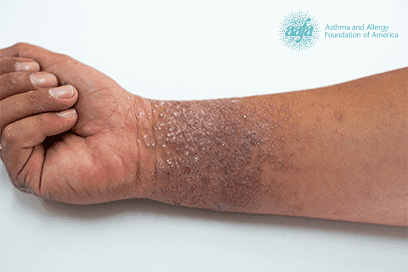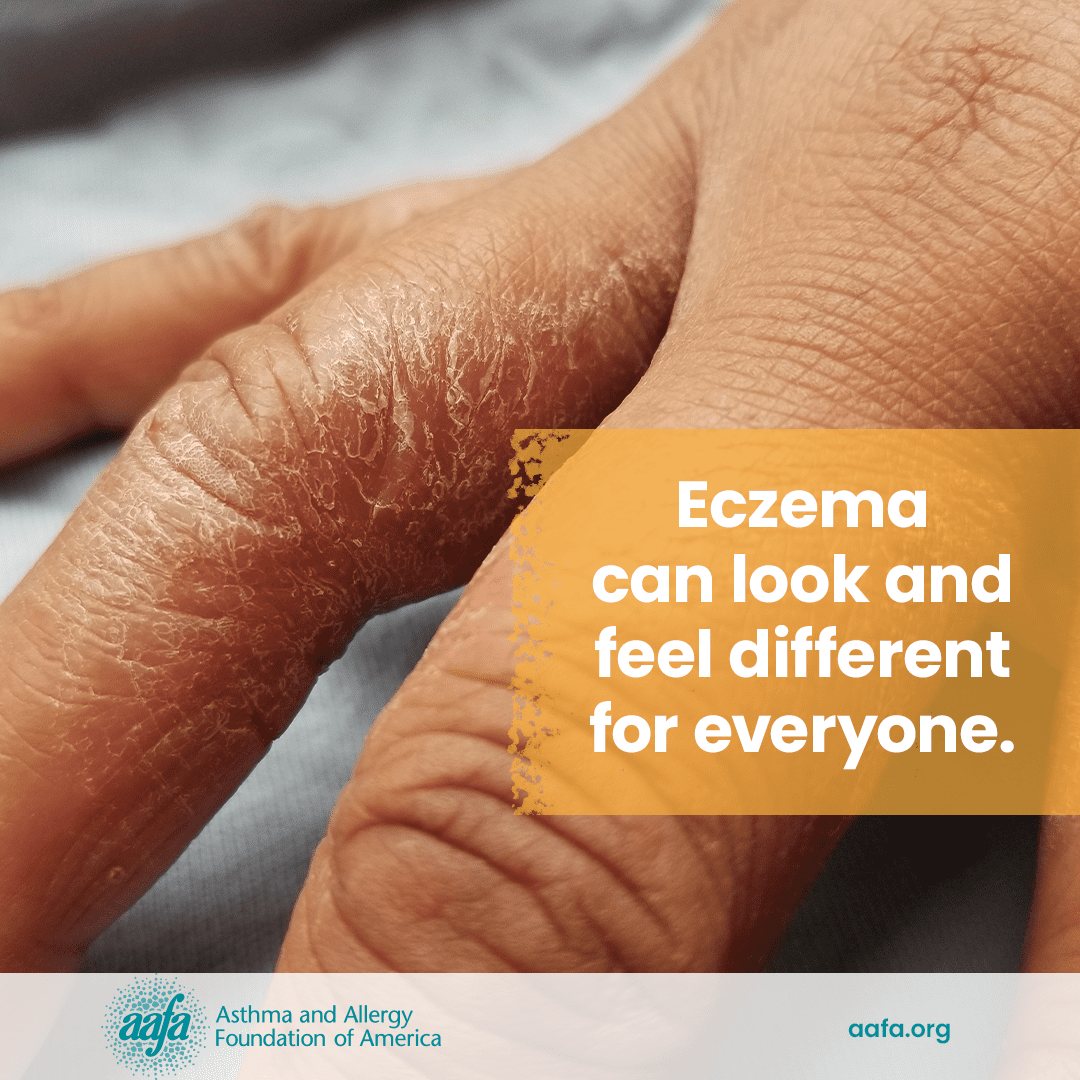Allergies
Eczema (Atopic Dermatitis)
What Are the Symptoms of Atopic Eczema?
Eczema can look and feel different for everyone. But it usually involves an itchy, scaly, rash that can show up on the face, hands, arms, legs, and other parts of the body. It may look ashen white/gray, purple, or dark brown on darker skin tones. It may look red on lighter skin tones. Eczema is linked to dry skin. Scratching eczema can lead to broken skin with oozing and skin infections.
 |  |
Eczema usually starts in babies. Eczema in babies can often show up on their faces. Children and adults also can have eczema. It can appear different at times or show up on different parts of the body. Eczema is usually linked to a personal or family history of allergies.
How Is Atopic Eczema Diagnosed?
There is no single test used to diagnose eczema, but there are a few things doctors use to tell if you have eczema:
Physical exam and review of medical history. Along with examining the rash, your doctor may ask when symptoms appeared and what happened around that time. For example, did you:
- Go hiking?
- Wear a new necklace?
- Use a new product, like laundry detergent?
- Go to the hairdresser for hair color, a perm, or other treatment?
Patch test. Certain types of dermatitis might suggest contact allergy. If your doctor suspects contact dermatitis, they may ask you to wear skin patches containing small amounts of possible allergens for two days. If you are allergic to the substance, you should develop a local itchy rash. The doctor will do a follow-up exam to check your reaction, usually two days after you remove the patch.
The doctor may need to see you more than once to make an accurate diagnosis. If you are seeing a general doctor, they may refer you to a specialist like a dermatologist or allergist.
What Triggers Atopic Eczema?
Eczema is different for everyone, but knowing what irritates your eczema will help you manage the symptoms.
Common triggers of eczema include:

Allergens (like dust mites, pet dander, latex, and pollen)
Soaps, lotions, detergents, and household cleaners
Metals such as nickel (in jewelry, cellphones, belt buckles, etc.)
Stress, emotions, and illness
Irritants (like fragrances, dyes, chemicals, and formaldehyde)
Temperature (heat, cold, dry weather)
What Is the Treatment for Atopic Eczema?
If you know what triggers your eczema, avoiding those triggers is important. Other treatments, like the ones below, relieve and prevent symptoms:
- Over-the-counter moisturizers and barriers aim to moisturize your dry skin and to prevent loss of water from the skin (Examples include Vaseline or a variety of lotions, creams, and ointment. Sleeping with moistened gauze over the affected areas also moisturizes your dry skin.)
- Over-the-counter medicines and products like topical hydrocortisone reduce inflammation
- Over-the-counter antihistamines (They do not typically help the itching from dry skin Although sedating antihistamines such as diphenhydramine (BENADRYL®) may help with sleep, they also impair alertness, even the next day. This can affect performance in school or driving ability.)
- Prescription medicines that reduce inflammation, such as:
- Oral or more potent topical corticosteroids
- Topical calcineurin inhibitors (TCIs)
- Systemic medicines and biological drugs
- Oral or topical antibiotics treat skin infections
- Phototherapy, which is the use of ultraviolet light under medical supervision, also may treat inflammation
Treating eczema can help relieve pain and itching, prevent infections, and improve quality of life. Remember to talk to your doctor to help create a treatment and management plan that will work for you.
Medical Review: October 2015















